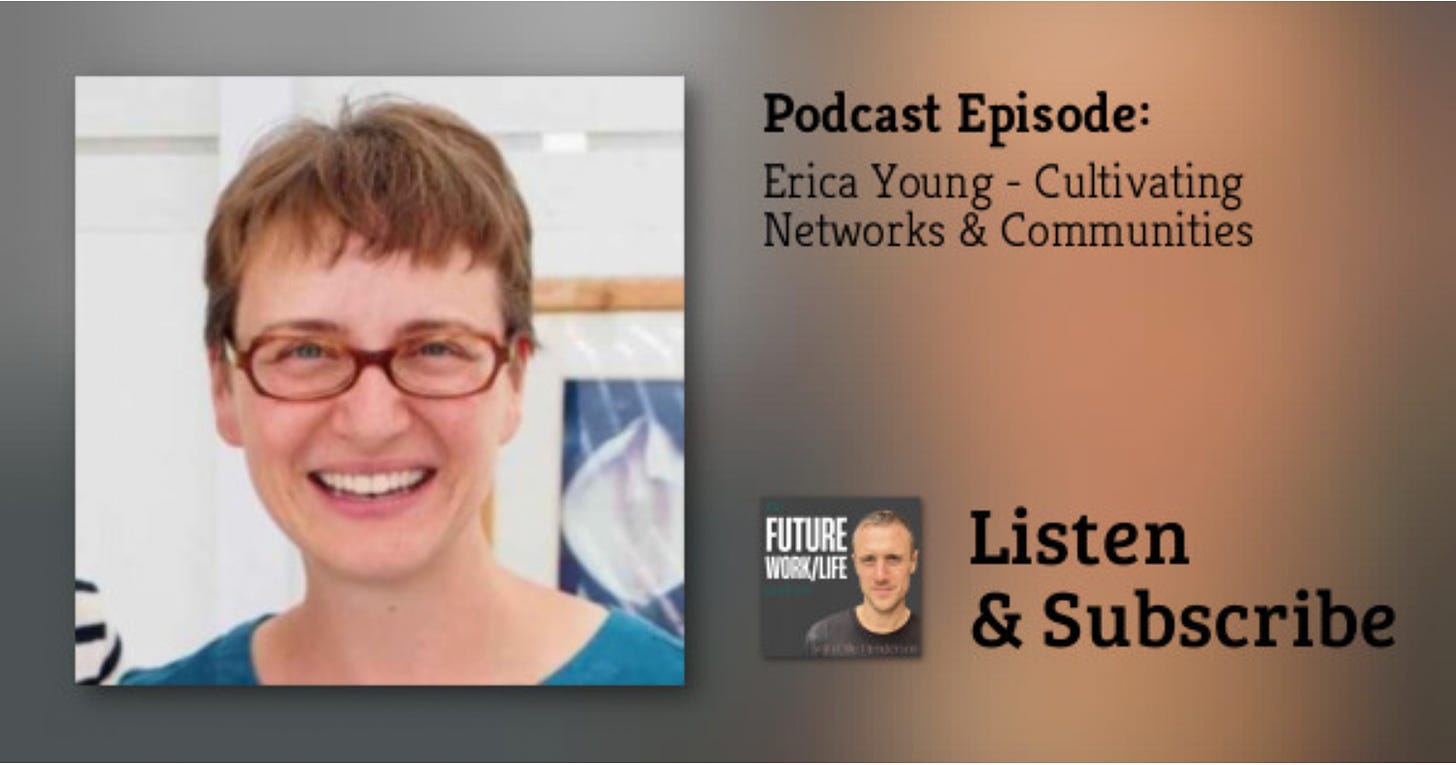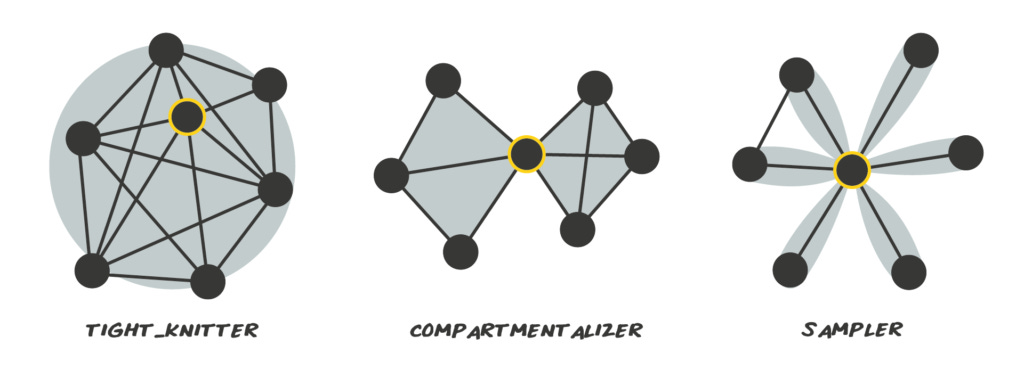Future Work/Life is a regular newsletter in which I share ideas, bring you interesting stories and articles, analyse industry trends and offer tips on designing a better work/life. If you enjoy reading it, please share it!
It wasn't that I never went to networking events. Or even that when I was there, I didn't wander the room keeping my eye out for interesting people to chat with. It's just that I'd rarely ever strike up a conversation.
I'm telling you this as someone who would quite happily go up on stage and make a presentation to hundreds of people or quite comfortably sit on a panel answering questions from an audience. I just had a mental block when it came to 'working a room', experiencing the Perspiration, Awkwardness, and Introversion of Networking – or PAIN for short.
I say 'had', but there haven't been too many opportunities for face-to-face networking over the past couple of years, which has come as a great relief to me. However, my conversation with Erica Young on the podcast last week is a beautiful example of how and why I've fundamentally changed my view of networks since I started my career transition in February 2020.
Since then, very much aware of my shortcomings when building connections, I've made a conscious effort to interact with anyone whose work I was interested in. Quickly realising these conversations were worth capturing, I started a podcast, leading to dozens more new relationships and, ultimately, a book deal too. Evidence that what begins as an exercise in satisfying your curiosity can lead to something much greater.
After reading her excellent article about the 'flipped workplace', for example, I introduced myself to Allison Baum Gates, who appeared on series one of the podcast. Following the show's release, we kept in touch. She later introduced me to Melissa Daimler and Tamika Curry-Smith and now to Erica, all of whom have proven themselves fantastic podcast guests and inspired new ideas that I've shared with you here and which will feature in the book. Thanks, Allison!
The point here is that as we consider the next step in our careers, it's easy to retreat to what and who we know. It might be an industry we've always worked in or a role that we can do with our hands tied behind our back. Critically, you may only seek the counsel of those closest to you, which, while undoubtedly valuable as a source of support, is the wrong strategy for making big changes. Limiting yourself to such a close-knit group can place unnecessary constraints on your future opportunities.
Why?
Not only is there value in gaining a broader perspective from a more diverse collection of people, as Mark Granovetter's paper on the concept of 'weak ties explained, these types of connections also increase the likelihood of finding new job opportunities.
You might adopt the ‘sample’ approach, with numerous one-to-one friendships, none of whom know each other. Or, even better, you could focus on 'compartmentalising' your network, reducing the chances of operating in an echo chamber – the downside of a 'tight-knit' network – and mitigating the risk of losing connection with a single link in the chain. In practice, this means building relationships with various groups independent of one another, each bringing a different point of view, set of expertise, and extended network of contacts, to the table.
[Erica Young]
Considering it this way sounds transactional, but I'm not suggesting that we opportunistically build relationships only with people who serve specific aims. Instead, as Adam Grant describes in his book, Give or Take, the greatest opportunities often result from reciprocity - as much as we should be thinking about what someone can do for us, we should consider what we can do for them. Even viewing the exercise with this frame can be useful if you're thinking about pivoting your career, as it's almost inevitable that at times you'll question whether your skills and experience are transferrable. What a great chance to remind yourself why you're legendary.
Of course, as with any part of your work/life, there's a trade-off to make. While it's critical to cultivate a robust and diverse network, it's also true that deeper relationships, built on trust and understanding, can inspire confidence and action. The challenge is to find the right combination of each.
As Erica writes in this excellent article, one way to start is to literally map our relationships on a piece of paper or use a tool like Powerpoint or Keynote. Once you sketch your network, you'll get a sense of its size and level of interconnectedness. Much as you might analyse gaps or areas of improvement in your skills or experience, use the same lens for the relationships you look to build.
In my case, my first objective two years ago was to open myself up to the idea of meeting new people and sharing ideas. Significantly, I took advantage of the overwhelming shift to digital communication. While online working has shrunk many people networks and reduced opportunities to develop those weak ties, I've embraced a format that plays to my strengths and significantly reduces the friction of starting those awkward conversations. If I'm curious about a subject and appreciate someone's ideas, I write a concise and thoughtful note to them - easy. More often than not, they respond and, in many cases, are open to chatting about their work and mine.
In my case, I've gone a step further and set myself the goal to collate the knowledge and insights I've gained to share with the Future Work/Life community. In turn, this has led to more people introducing themselves and to me making introductions to others in my growing network.
Cultivating a network and building a community is, it seems, another magical example of the work/life flywheel in motion.
Have a good week,
Ollie
Read more about networks in Erica’s excellent newsletter, ‘The Reliants Project’ and listen to our podcast chat HERE.
Any other Business:
As Viv Groskop writes in the Financial Times, “there’s a lot of buzz in the air about “toxic colleagues” and the reluctance to re-engage with them.” What’s also true, though, is that there are jerks everywhere, and Groskop makes the case that going back to the office may help us understand the humanity of bullies and bad bosses. As she explains:
"No permutation of geography, location or work habits can protect you from idiots, sociopaths and people who are basically a bit dysfunctional. These people are everywhere. Is it easier if you don’t have to rub shoulders on a daily basis? As a self-employed person, I can tell you this: only marginally. Unless you are a hermit or unpublished poet with a trust fund, all work involves some kind of human contact at some point. And many work interactions — in the office or online — will throw up disagreements and displays of ego.”
I’ve written about both experiencing collective joy and the benefits of ‘group flow recently, and this article from Psychology Today discusses how they relate to one another in the form of ‘communitas’.
Another reminder that all is not equal when it comes to working-from-home - this Wired article explores how “Women in Tech Have Been Pulling a 'Second Shift' for’, including how 'in the 1960s, some women programmers worked from home while fulfilling household chores”, while, “decades later, women are still being asked to work more for less.
I’ve seen a couple of reports saying the same thing over the past couple of weeks - a lack of face-to-face time with managers is causing employees to quit. This Irish Times article cites the Robert Walters survey, which found 22% of people “don’t really communicate with their manager when working from home” (up from 3% pre-pandemic). The knock-on effect is that:
“Many professionals believe that this increasing lack of contact with their line manager has resulted in them being overlooked for new opportunities (44 per cent), progression (37 per cent) and training (26 per cent).”
Andy Spence’s counter-argument to the call for a 4-Day week rightly points out that ‘the four-day week will work for some but comes from the same bossy, command-and-control thinking as the five-day week.”





